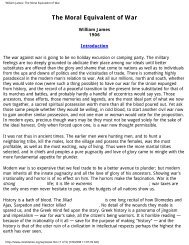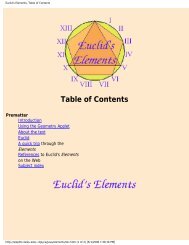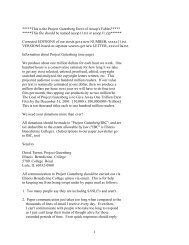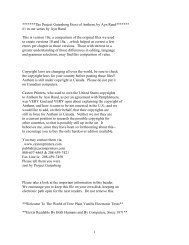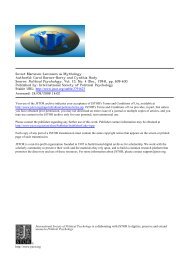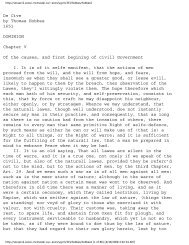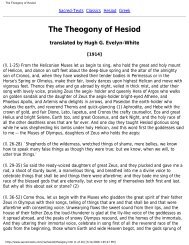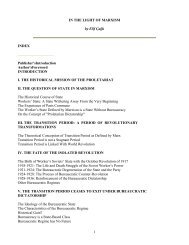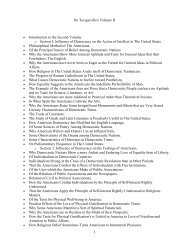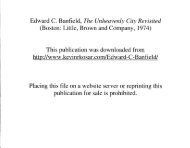Project Gutenberg Etext of The Large Catechism, by Martin Luther
Project Gutenberg Etext of The Large Catechism, by Martin Luther
Project Gutenberg Etext of The Large Catechism, by Martin Luther
You also want an ePaper? Increase the reach of your titles
YUMPU automatically turns print PDFs into web optimized ePapers that Google loves.
From this it again appears how highly these Ten Commandments are to be<br />
exalted and extolled above all estates, commandments, and works which<br />
are taught and practiced aside from them. For here we can boast and<br />
say: Let all the wise and saints step forth and produce, if they can, a<br />
[single] work like these commandments, upon which God insists with such<br />
earnestness, and which He enjoins with His greatest wrath and<br />
punishment, and, besides, adds such glorious promises that He will pour<br />
out upon us all good things and blessings. <strong>The</strong>refore they should be<br />
taught above all others, and be esteemed precious and dear, as the<br />
highest treasure given <strong>by</strong> God.<br />
Part Second. OF THE CREED.<br />
Thus far we have heard the first part <strong>of</strong> Christian doctrine, in which<br />
we have seen all that God wishes us to do or to leave undone. Now,<br />
there properly follows the Creed, which sets forth to us everything<br />
that we must expect and receive from God, and, to state it quite<br />
briefly, teaches us to know Him fully. And this is intended to help us<br />
do that which according to the Ten Commandments we ought to do. For (as<br />
said above) they are set so high that all human ability is far too<br />
feeble and weak to [attain to or] keep them. <strong>The</strong>refore it is as<br />
necessary to learn this part as the former in order that we may know<br />
how to attain thereto, whence and where<strong>by</strong> to obtain such power. For if<br />
we could <strong>by</strong> our own powers keep the Ten Commandments as they are to be<br />
kept, we would need nothing further, neither the Creed nor the Lord's<br />
Prayer. But before we explain this advantage and necessity <strong>of</strong> the<br />
Creed, it is sufficient at first for the simple-minded that they learn<br />
to comprehend and understand the Creed itself.<br />
In the first place, the Creed has hitherto been divided into twelve<br />
articles, although, if all points which are written in the Scriptures<br />
and which belong to the Creed were to be distinctly set forth, there<br />
would be far more articles, nor could they all be clearly expressed in<br />
so few words. But that it may be most easily and clearly understood as<br />
it is to be taught to children, we shall briefly sum up the entire<br />
Creed in three chief articles, according to the three persons in the<br />
Godhead, to whom everything that we believe is related, So that the<br />
First Article, <strong>of</strong> God the Father, explains Creation, the Second<br />
Article, <strong>of</strong> the Son, Redemption, and the Third, <strong>of</strong> the Holy Ghost,<br />
Sanctification. Just as though the Creed were briefly comprehended in<br />
so many words: I believe in God the Father, who has created me; I<br />
believe in God the Son, who has redeemed me; I believe in the Holy<br />
Ghost, who sanctifies me. One God and one faith, but three persons,<br />
therefore also three articles or confessions. Let us briefly run over<br />
the words.<br />
62



